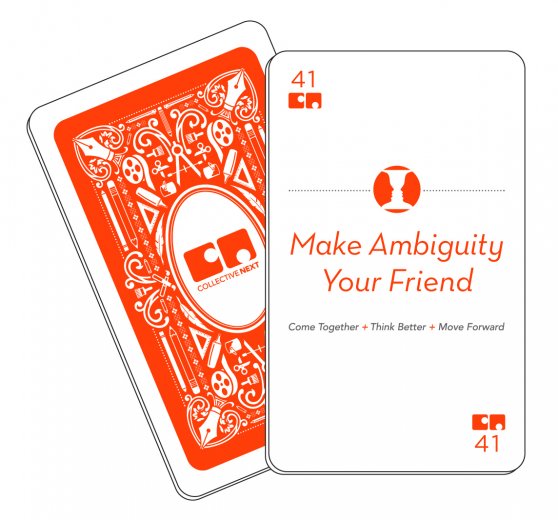This is one of a series of posts we’re running about the Collective Next Cards.
“Here’s what we want it to look like. We need to make something kind of like a round sign, but with a more square-ish shape. It can’t be completely square, though. It should feel modern, but a classic kind of modern. It should be suitable for anyone speaking any language around the world, but don’t forget that this is for a domestic audience only. We shouldn’t make it too disco. Think of it as Kimye meets the 1975 Cincinnati Reds meets the second season of Twin Peaks. Does that make sense?”
Everything is becoming more and more complicated. Every day. Choices, choices, choices… What decision should we make? Do we have to choose? Why can’t we try to run in all directions at once? A lot of people in this world would like everything to be black and white, clear-cut choices for everything, no uncertainty. But this world doesn’t work that way. If it did, it would be boring. Ambiguity, on the other hand, is never boring. And it is often beautiful.
There’s a line from composer John Cage that we use a lot here at Collective Next: “Begin anywhere.” I love John Cage and all that he left us, and he really lived the idea of “begin anywhere” when it came to his work. He also believed in carrying through with whatever it is that you began. Live in the ambiguity that you choose to “set right,” or swim around in for a while until you find your way.
Whether you’re friends with ambiguity or in a more tenuous relationship, it’s never going to leave you. Let me share some of what I have learned over the years from my dear friend Ambeegyooi’T:
- Ambiguity gives you the freedom to ask a lot of questions
- As Cage knew so well, ambiguity gives you freedom to start anywhere, to make a suggestion, to suggest an anchoring point or idea to get going.
- Ambiguity surprises you. It opens the possibility to be surprised. Who doesn’t like a nice surprise?
- Ambiguity helps you to get past preconceived notions.
- There is really no wrong “answer” if you are in an ambiguous situation. There are only more or less appropriate responses (and some of those responses can be ambiguous, too).
- You can discover things you might not otherwise.
- Ambiguity teaches you to let go of control, to go with the flow and only worry about controlling what you can.
So what do you do when the football and the duck run that marathon, and you’re on the other side of the aisle listening to someone’s brother tell a sandwich about smelling the elephant’s drum kit?
Exactly. Just go with it.
Back




